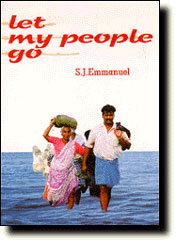 |
Those of us who have listened to Father Emmanuel will understand the depths of sorrows in which he states how aghast he feels about the conditions of his beloved people in Sri Lanka’s house of bondage, that contemporaneous modern day Auschwitz, the Wanni. Father Emmanuel was witness to the tragedy of his people fleeing Jaffna town, crossing Kilali lagoon and settling in the vast dry area of the jungles of the Wanni. No one could be better equipped to relate the tragedy of a people whose ancient civilization goes back to more than two thousand years. Emeritus Archbishop Desmond Tutu is appropriately quoted (page 91)
Definitely not in Sri Lanka. The Tamils needed a Prabhaharan to protect them from all the horrible and inhuman atrocities of the cruel Sinhala army. It is they, the Sinhalese who created Prabhaharan, not anybody else. Prabhaharan was only waiting to happen in the context of broken pledges, blatant acts of discrimination, Ceausescu style colonization of the Tamil homelands and the hostile ferocity of the Sinhala army of occupation. The "My Lai" massacre is spoken of as the most bestial depths of American brutality. But "My Lai" is nothing compared to the several "My Lai" perpetrated in the Tamil Northern and Eastern Provinces. Simon Winchester, the British Times top flight journalist once wrote of the terrible fate that befell "The village that died in a day", This was the village of Tihiriya in the Trincomalle district. He related the death and destruction, that visited Tihiriya. Father Emmanuel provides us with a macro-picture of the "My Lai" that constitutes the Tamil country today. Father Emmanuel has written a Jeremiad full of rage and full of grief. In chapter 7 and 8, he chides the UN Commission for Human rights and the world; for its indifference to the sufferings of the Tamil people. He rightly asks (page 86)
This is a most shameful page in their (Sinhalese) history. And all done in the name of the world’s most compassionate one, the Prince of Enlightenment, the great Lord Buddha. Even pious Buddhist priests who should know better urge the Sinhala Buddhist State to persist in their carnage. Can there be any hope? The Catholic Church the world over has developed a truly Christian conscience and been in the forefront in the war against poverty and oppression. Their concern for the miseries of the poor Tamils is no exception. They are very well placed to challenge the humanitarian conscience of an otherwise indifferent world. Father Emmanuel is one of the standard bearers and he has done well in writing this soul-searing account of the calamity that has befallen the Tamils of Sri Lanka. This is a book that should be read by every human rights activist, and generally speaking, by all students of comparative politics of the States of South Asia. |
|
| Let my people go: The Tamil Struggle
for Survival and Self-Determination in Sri Lanka By Father S. J. Emmanuel (1997, Published
by The Tamil Catholic Chaplaincy, Germany) Reviewed by Prof. Alfred Jeyaratnam Wilson Ph.D. (LSE) D.Sc. (Economics) London. |
||
| A limited number of copies of this book are available for North American Residents Via the sangam. Please send a check for US$ 10.00 made to Ilankai Tamil Sangam,USA and mail to: Dr. N. Jeyalingam, 46 Susan Drive, Newburgh, NY 12550, USA. |